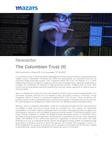
The Colombian Trust (II)
In our previous column, we analyzed the advantages of structuring businesses or reorganizing family estates using a Colombian mercantile trust when the beneficiaries are individuals who are not required to keep accounting records. This is because Article 102 of the Tax Statute ("E.T."), when establishing the fiscal transparency regime in commercial trust agreements, expressly established an exception for individuals not required to keep accounting records, indicating that, for them, their income from the trust activity would be realized when the trust makes a payment or credit on account (cash principle).
Now, it is important to analyze this issue with respect to another group of actors that participate in the Colombian economy and that are not obliged to keep accounting records in Colombia: foreign companies without a branch or permanent establishment in the country. These companies can perfectly well be trustors and beneficiaries of autonomous estates in Colombia and not, by that fact, the fiscal transparency established in article 102 of the Tax Statute would be extended to them.
Although, from an exegetical interpretation of the rule it could be concluded that only natural persons not obliged to keep accounting records would be excluded from such regime, the reasonable interpretation of the same leads to understand that the principle of transparency does not apply to all those persons (natural or not) not obliged to keep accounting records in Colombia (including, in this group, foreign companies or entities not obliged to keep accounting records in Colombia). Since, according to the principle of transparency, the beneficiary must declare the income, costs, expenses, assets and liabilities of the autonomous patrimony (regardless of whether the same has made distributions or not), to understand that this regime would apply to foreign entities not obliged to keep accounting in Colombia would be to distort the general rule of Article 592 paragraph 2 of the E.T. which establishes the premise according to which foreigners, whose total income has been subject to withholding tax, would not be obliged to file income tax returns in Colombia.
In fact, this is the handling that has been given to the issue by several fiduciary entities. In addition to this, when foreign legal entities (trustors and beneficiaries) reinvest the resources invested in an autonomous patrimony and do not withdraw the surpluses, only the withholding at the source corresponding to the profits accumulated during such taxable period is caused at the closing of the taxable year.
However, if the control of the foreign company is exercised by one or more Colombian tax residents, in principle, the regime for foreign controlled entities (ECE regime) would apply, which would imply taxation of such passive income in Colombia. This might not occur if there were, within the framework of the trust agreement, an irrevocable instruction or mandate that would prevent the exercise of control by the tax resident, delegating it to a neutral third party that could make decisions at its discretion.


